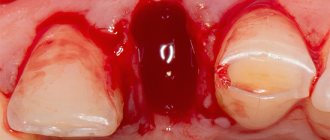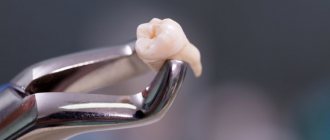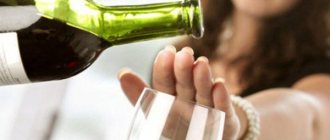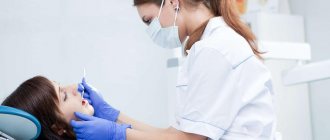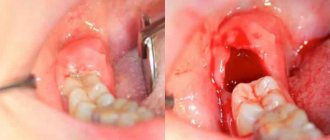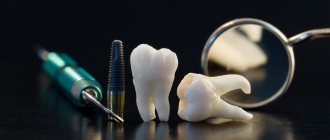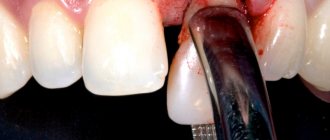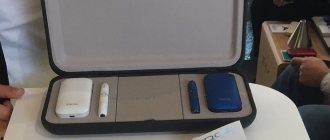The process of tooth extraction - and what follows it
From the outside it may seem that this operation is simple and not worth attention: the doctor administered local anesthesia and “pulled out” the diseased tooth. Problem solved. However, from a medical point of view, tooth extraction is not such a trivial operation, especially when it comes to “eights” or dystopic units. Most often, their roots are curved and can catch on the roots of neighboring ones. Therefore, in order not to injure healthy teeth, “problem” teeth are removed in parts. This procedure is more traumatic than simple removal; in addition, complications may arise after it, because fragments may remain in the wound, which will provoke inflammation.
But even if the unit is removed without problems, an open wound remains in its place, which continues to bleed for some time. Of course, the surgeon closes the hole with a cotton-gauze swab, which must be removed no earlier than 20 minutes after application, but this time is still not enough for the wound to heal.
Attention! Bleeding after tooth extraction should stop within 15-20 minutes, and there may be slight bleeding from the wound for about two to three hours after the operation. If the bleeding continues for more than 30 minutes after removal or resumes several hours after the bleeding has stopped, then you should urgently consult a doctor. In these cases, it is strictly forbidden to rinse your mouth or put any medicine into the wound. The only help that can and should be provided at home is to apply ice (wrapped in a towel) to the cheek behind which the wound is located.
The body’s defense system also comes into play - and the hole closes with coagulated blood. However, this protection cannot be called flawless, because the blood clot may not completely cover the surface of the wound or it can be damaged by eating. The longer the clot remains on the wound, the faster its healing occurs.
There is another factor that can slow down tissue regeneration - edema. With it, the vessels are compressed, and blood circulation at the site of removal slows down, which means that the recovery processes slow down.
Is it possible to smoke with an open tooth canal?
Going to the dentist is stressful for almost every person, despite the fact that modern dentistry uses the latest treatment methods, modern equipment and painkillers to ensure maximum comfort and eliminate pain for the patient. At the same time, many heavy smokers are interested not so much in treatment as in the question: is it possible to smoke after dental treatment at the dentist? And it doesn’t matter whether we are talking about light fillings, anesthesia (anesthesia) or wisdom tooth treatment.
This type of treatment, aimed at saving damaged teeth, is the most common. Depending on the complexity of the case, treatment procedures may be carried out over several visits to the doctor.
As a rule, all manipulations to clear the cavity, open the canal, remove the nerve, and grind the sharp edges of the tooth are carried out under local anesthesia, so it is important to allow the anesthesia to wear off after the procedure. The period of abstinence from smoking can range from 2 to 24 hours.
If we are talking about placing a permanent filling, then the doctor will definitely warn you that during the first 2 hours it is strictly forbidden to smoke any sources of tobacco smoke, including completely harmless electronic cigarettes, hookahs and vapes.
When tobacco smoke enters the oral cavity, nicotine has a harmful effect on the tissues damaged around the tooth, on the material from which the filling is made, and slows down the recovery process after local anesthesia. The ideal option is to quit smoking for 24 hours.
If we are talking about a temporary filling, then to the delight of smokers, they can resume smoking right after the dentist’s office. But after 5-7 days, when the doctor replaces the temporary filling with a permanent one, then the smoking ban will come into force! We need to remember this.
There are two options to solve the problem. The first is to completely stop smoking for the period recommended by the doctor. Well, those who simply cannot live without nicotine need to rinse their mouths with special mouthwashes for smokers after each smoking.
We advise you to read: Plaque on teeth, what is it?
So is it possible to smoke after dental treatment at the dentist? If you have been given a temporary filling, then you can smoke, but if we are talking about a permanent filling, then you should refrain from smoking for the time specified by the dentist.
Then come to us for a marathon on quitting cigarettes. With its help it will be much easier to quit.
source
Is it strange that they didn’t apply a temporary filling? ! No big deal overall.
Kuri doesn’t wake up anything, except that the arach is still poking around to clean the hole.
Alas, some people in our society are susceptible to a bad habit - smoking. We will not describe the dangers of this habit, and provide evidence of how teeth deteriorate from cigarettes. The article is devoted to a more practical issue - when will it be possible to smoke the first cigarette after tooth extraction surgery.
Tooth extraction at the DaVinci aesthetic dentistry clinic is performed using the most modern instruments and preparations. The patient must be given an anesthetic injection so that he does not feel pain during the operation. But still, tooth extraction is an operation. After it, an open wound will appear in the mouth, the size of which depends on the size of the tooth. Sometimes dentists place drainage and stitches in the gum. The wound will prevent you from eating your usual foods for some time, but if the patient follows all the doctor’s recommendations, then no complications will arise, and soon the hole will stop bothering you.
- 20 minutes after the operation, you need to remove the tampon soaked in antiseptic. During this time, the bleeding should have stopped and the wound should be disinfected. If you leave the tampon in longer, the accumulation of blood and saliva will make it an ideal environment for bacteria to grow.
- A blood clot forms at the wound site, which cannot be picked out and spat out, as it will affect the formation of bone tissue, but for now it will become a natural obstacle to bacteria.
- If you have been prescribed rinses, you need to do them very carefully so as not to wash out the blood clot. It is best to simply draw up the solution, hold it in the desired area for 2-3 minutes and spit. Too vigorous rinsing will damage the clot and slow recovery.
- Sometimes the dentist will apply medication to the socket to speed up healing. They also cannot be removed ahead of time.
- Teeth brushing and rinsing can be done one day after surgery. Only movements with the brush must be careful so as not to remove the blood clot.
- After a complicated wisdom tooth extraction, your dentist may prescribe antibiotics to prevent the infection from spreading. The patient needs to follow the treatment regimen.
- To relieve pain, it is better to apply ice to the cheek; if the pain does not subside, you can take a painkiller.
We advise you to read: Aching wisdom teeth, what to rinse
Smokers are used to dealing with stress with a cigarette. Removal surgery is a lot of stress. And I really want to smoke. But it is better to avoid this method of calming down for a few hours. The fact is that cigarette smoke contains chemicals and tars that can become an irritant to the wound. Chemicals can cause increased bleeding from the socket and slow down wound healing. The minimum time before the first cigarette is 2 hours. But it will be possible to smoke only if the bleeding has stopped completely, but you should not drag on too much so that the bleeding does not return.
Cigarette smoke irritates the edges of the wound. Sometimes a bad habit can cause a dry socket - that is, a blood clot necessary for the wound to heal quickly can be removed with the help of smoke. In this case, the wound remains without a barrier and becomes open to infection. A person lights another cigarette or eats food, and microbes enter the wound cavity. The inflammatory process begins. It is manifested by headache, general malaise, fever, redness and acute soreness of the gums.
If the dentist put stitches during surgery, you should stop smoking for a longer period - from two to ten days. Even 1 cigarette can cause harm and delay the healing process for a long time. Within 10 days, the wound heals completely, the sutures dissolve. And then you can afford your first cigarette. Although a forced refusal may lead to the complete destruction of the habit.
Removing wisdom teeth, as already mentioned, requires more serious measures. In some cases, the operation is complicated by a wide, overgrown root. Therefore, it is sometimes necessary to remove such a tooth in parts. In this case, it is better to immediately check with your dentists when you can smoke a cigarette and follow all the recommendations so that the wound heals without complications.
We advise you to read: Methods for determining the activity of dental caries
And if you nevertheless ignored the advice of doctors, and bleeding began from smoking, do not self-medicate, consult a dentist.
Smoking after tooth extraction is strictly prohibited. There are many reasons for this, since nicotine has an adverse effect on the entire body.
This is primarily due to the fact that tooth extraction is a surgical procedure, as a result of which a person receives severe stress. Therefore, after the end of the manipulation, the patient should rest well and avoid physical or mental stress.
Dangers of smoking after tooth extraction
Tobacco smoke contains hundreds of different components - from tar to combustion products - that are harmful to the body. However, when smoking, these poisons pass through a number of barriers, starting with the oral mucosa, which takes the brunt of the blow.
But an open wound in the oral cavity is a “door” for poisons and toxins that easily penetrate directly into the blood, and thus the poisoning of the body intensifies. In addition, during smoking, the temperature on the surface of the mucous membrane increases, which means that both blood circulation and bleeding increase. Thus, intoxication of the wound and the entire body occurs several times faster.
Important! You shouldn’t rely on the opinions of friends or Internet users who tell you how they lit a cigarette after tooth extraction and nothing bad happened. Everyone has a different state of health, a different scope of surgery. For example, in some situations the wound has to be sutured and drained. That's why other people's experience is not indicative.
In addition, during smoking, at the moment of “puffing”, a so-called vacuum traction effect is created in the mouth. This traction can dislodge the blood clot or pull it out of the socket. And then the pathology of “dry socket” develops: air begins to get on the exposed nerve endings and bone, and with it tobacco smoke and infection.
Is it possible to smoke after tooth extraction surgery?
Smokers are used to dealing with stress with a cigarette. Removal surgery is a lot of stress. And I really want to smoke. But it is better to avoid this method of calming down for a few hours. The fact is that cigarette smoke contains chemicals and tars that can become an irritant to the wound. Chemicals can cause increased bleeding from the socket and slow down wound healing. The minimum time before the first cigarette is 2 hours. But it will be possible to smoke only if the bleeding has stopped completely, but you should not drag on too much so that the bleeding does not return.
Cigarette smoke irritates the edges of the wound. Sometimes a bad habit can cause a dry socket - that is, a blood clot necessary for the wound to heal quickly can be removed with the help of smoke. In this case, the wound remains without a barrier and becomes open to infection. A person lights another cigarette or eats food, and microbes enter the wound cavity. The inflammatory process begins. It is manifested by headache, general malaise, fever, redness and acute soreness of the gums.
If the dentist put stitches during surgery, you should stop smoking for a longer period - from two to ten days. Even 1 cigarette can cause harm and delay the healing process for a long time. Within 10 days, the wound heals completely, the sutures dissolve. And then you can afford your first cigarette. Although a forced refusal may lead to the complete destruction of the habit.
Removing wisdom teeth, as already mentioned, requires more serious measures. In some cases, the operation is complicated by a wide, overgrown root. Therefore, it is sometimes necessary to remove such a tooth in parts. In this case, it is better to immediately check with your dentists when you can smoke a cigarette and follow all the recommendations so that the wound heals without complications.
And if you nevertheless ignored the advice of doctors, and bleeding began from smoking, do not self-medicate, consult a dentist.
Add a comment
Leave your comment
When is the best time to quit smoking?
After any tooth, and especially a wisdom tooth, has been removed, it is better to put off cigarettes until the hole is completely tightened. If it is very difficult to quit smoking for such a long period, then you need to wait at least 2-3 hours. By that time, the bleeding will stop completely and a clot will begin to form, closing the wound.
If the operation was labor-intensive or some complications arose after it, then smoking after it will aggravate the situation. There are often cases when heavy smokers, a few days after tooth extraction, ended up in the emergency maxillofacial surgery department with more severe diagnoses - phlegmon, abscesses and others.
The effect of smoking on teeth
Many pathologies develop when a person smokes. Dental diseases are no exception. The causes and consequences of smoking are as follows:
- exposure to high temperature smoke leads to damage to the enamel, the appearance of microcracks in it, in which pathogenic microorganisms accumulate;
- due to tar, the enamel color changes to yellow;
- normal acidity is disrupted, which stimulates the spread of bacteria throughout the oral cavity;
- the risk of developing periodontal disease, gingivitis, caries, and leukoplakia increases.
Smoking marijuana and hashish also negatively affects the condition of teeth and gums. Weed eaters have an increased risk of periodontal disease and tooth loss.
How long should you not smoke after stitches?
Many people believe that if sutures are placed on the gums after tooth extraction, this protects them from the negative consequences of smoking: the hole is closed, there is no bleeding.
However, everything is quite the opposite. If the surgeon put a suture, it means that the operation was more difficult, and its area exceeds the size of a regular hole. As a rule, this happens if dystopic teeth are extracted, which can cling to neighboring teeth with their roots, or if suppuration was present on the roots of the removed unit. Then, in addition to extracting the tooth itself, the alveolar socket is cleaned with the obligatory removal of pus and rinsing the cavity with an antiseptic. In this case, the doctor necessarily prescribes the patient a course of antibiotics, and sometimes physiotherapeutic procedures.
In this case, it is better to refrain from smoking until the stitches are removed, that is, for 10-12 days. And the minimum period when you can take a cigarette is 48 hours after the operation.
“Girls, it is very important to follow the doctor’s recommendations after removal! I learned this from my own experience. They pulled out the “eight” - and I was happy and went to the dacha for barbecue. Yes, I went to the bathhouse. I also smoked hookah after it. And that's it, complications! The gums became swollen, I had to do a second operation to remove the pus. Then I couldn’t chew for two weeks, I only drank soups and compotes. But I lost 5 kg, but at what cost!”
Jenya84, review from the woman.ru forum
What are the risks of smoking after the procedure?
When a dentist pulls out a diseased tooth, a wound remains at the site. If you immediately smoke, the chemicals contained in cigarette smoke will lead to an inflammatory process in the socket. They will slow down the healing process and may also cause bleeding.
A blood clot should remain in the resulting wound. Its displacement will lead to the penetration of pathogenic microorganisms into the wound. Inflammation will lead to fever, headache, and deterioration of health. This threatens the development of alveolitis, a condition accompanied by an acute inflammatory process in the walls of the formed hole. Its onset is accompanied by swelling of the gums, which then spreads to the soft tissues of the face. The color of the gums changes to bluish; in severe cases, necrotic processes are observed.
Alveolitis can develop into osteomyelitis. In this condition, a purulent focus appears in the bone and a fistula forms. Interstitial pneumonia can also be a consequence of alveolitis. Non-smokers are much more likely to avoid complications after surgery. All of the above explains why you should not smoke immediately after tooth extraction.
As a result of the spread of infection through the bloodstream, serious complications are observed, including those affecting the heart. Signs of mild sore throat may occur - sore throat and enlarged tonsils. This begins after major operations and indicates the activation of protective functions to prevent the spread of inflammation.
The displacement of the clot is explained by an increase in pressure after smoking. The situation is complicated by the fact that the blood vessels are already narrowing. Removal of molars is a stressful condition for the body, to which the adrenal glands react with the release of adrenaline. Under its influence, narrowing occurs. Therefore, nicotine does not eliminate the stressful state, but only aggravates it.
After smoking, symptoms of stress increase:
- tachycardia;
- muscle tension;
- activation of intestinal motility;
- increased breathing;
- angina pectoris.
The restrictions apply not only to cigarettes, but also to hookah. Tobacco contains resins and other substances that have a bad effect on healing. Hookah mixtures often contain glycerin, which has dehydrating properties. Therefore, smoking hookah after surgery is also prohibited. The same substance is also found in e-cigarette liquids.
Are hookahs and electronic cigarettes safe?
Another misconception is that the smoke from a hookah or vape (electronic cigarette) contains mainly vapor and is not harmful, and therefore can be smoked after tooth extraction. However, it is not. There are, of course, several times fewer harmful substances in the vapor of both hookah and vape than in cigarette smoke, but the temperature of the vapor is still quite high and has a negative effect on the blood vessels of the oral cavity. They expand, which can cause re-bleeding. Additionally, vacuum traction can damage or disrupt the blood clot, opening the wound to infection.
Doctors advise abstaining from hookah and vaping for at least 2-3 hours after surgery. But it is best to postpone smoking until the hole has completely healed.
Help: how smoking affects the condition of teeth
In addition to the postoperative period, when you simply need to give up cigarettes, you need to understand the impact they have on the condition of the oral cavity as a whole.
Heavy resins, nicotine, chemical elements - all this settles on the tooth enamel, leading to the following irreversible changes:
- changes in the color of tooth enamel;
- formation of dental plaque;
- the formation of tartar.
Smokers develop tartar more often than those who do not have this bad habit.
Yellow teeth, of course, lend themselves to whitening procedures, but this result will not last long, since smoking disrupts the structure of the tooth enamel, tiny cracks form in it, and the staining of the enamel with substances that may be contained in food and drinks is activated. In addition, cigarette smoke contains tar, which contributes to the unpleasant yellow color.
Cigarette lovers are more likely to experience tooth loss. By reaching retirement age, there is a risk of losing more than half of your teeth. In addition to the detrimental effects on tooth enamel, smoking negatively affects the entire oral cavity - the gums become weaker and more vulnerable to inflammatory processes, the throat is more at risk of respiratory diseases, and bad breath repels close communication with such a person.
Quitting smoking is not easy, but it has the following advantages:
- The smell from your mouth will disappear. For those who do not smoke, the breath of smokers is very unpleasant. This can interfere with meeting and establishing relationships with the opposite sex.
- Your teeth will stop turning yellow.
- The immunity of the oral cavity will increase - during viral epidemics the risk of getting sick is reduced.
- The general condition of your teeth will be better, and a visit to the dentist will be more preventative than curative.
- The risk of inflammatory diseases of the oral cavity – periodontitis, gingivitis, as well as the risk of caries and tartar will be reduced.
- Smoking is one of the most common causes of cancer; Quitting smoking reduces the risk of cancer.
Of course, everyone decides for themselves what lifestyle to lead and what habits to have. But at least you should follow the most basic rule for smokers - abstain from cigarettes for at least the first few hours after tooth extraction surgery. In this case, the healing process will proceed more quickly and less painlessly, in addition, this is a good reason to test your endurance, and maybe even give up the bad habit completely.
If you have any questions or want to add something, leave your comments below.
Features of care during the first time after surgery
Before performing the operation, the patient must note the presence of allergies to medications, whether the intervention was recently performed, medications currently used, existing illness, pregnancy and other aspects reflected in the health questionnaire. For those who smoke, it is important to make a note of this.
After the removal of the figure eight, many people are concerned about their eating, drinking, and smoking habits. As a rule, the operation is performed on an outpatient basis and does not always fall into the category of complex manipulations (depending on the clinical picture in the oral cavity). However, injury to the bone and mucous membrane at the site of traction still occurs. After extraction, an open wound of quite large size is formed in the bone tissue of the jaw. In order not to lead to the development of complications in the postoperative period, it is important to follow a number of recommendations from the dental surgeon.
After removal, the doctor places a cotton ball on the freed hole. If the manipulations were performed for a long time, an antiseptic (Alvogil) should be added to the resulting cavity. If during the operation there was significant bleeding from the socket, then after traction the applied tampon should be moistened with a hemostatic agent. A cotton ball is applied for 20 minutes. During this time, the patient is not recommended to perform articulatory movements. After this period, the tampon must be removed.
Typically, a blood clot, which promotes tissue restoration and healing in the area of intervention, forms on average within 15 minutes. A tampon placed on the socket helps protect the resulting clot from accidental washout and ingestion. After spitting, you should not touch the hole of the removed figure eight with your tongue or try to spit out the bloody contents. It is not allowed to rinse or apply mechanical stress on the side of the intervention.
Tooth extraction is a traumatic intervention in the oral cavity and the body requires a certain amount of time to restore body tissues. The patient needs moral and physical rest, during which it is desirable to limit the use of harmful addictions.
If the doctor, during the removal process, notes that the body’s reserve abilities for healing will not be enough, he introduces drugs with regenerative properties. After removing the tampon, you should also not try to remove them.
Usually, before the intervention, the doctor performs a figure-of-eight X-ray, preferably a targeted one. If the anatomy of the roots is detected in the form of a curved and overgrown type, the doctor should prescribe antibacterial drugs in a course dosage.
Immediately after removal of the figure eight, it is not recommended to drive a vehicle, since against the background of anesthesia, which is usually carried out locally, there is a decrease in concentration and, less often, drowsiness.
What not to do after removal
In addition to the fact that you cannot smoke, there are other restrictions when removing teeth that should be strictly observed.
| Recommended Limits | Causes |
| For 2-3 days after the procedure, you should not brush your teeth with toothpaste or a brush, or rinse with plain water. At the site of the pulled out tooth, a blood clot forms, covering the wound. Pathogenic microorganisms cannot penetrate through such a barrier, which means healing will be faster. When brushing your teeth, the bristles can catch and tear off this clot, and at the same time leave other scratches on the gums, through which germs can enter the bloodstream. The same applies to rinsing, because the water can also contain various bacteria. To speed up healing and get rid of the unpleasant taste in the mouth, you can use disinfectant pharmaceutical solutions or homemade decoctions of medicinal herbs, but not earlier than on the second day |
| On the first day, you should avoid taking a hot bath and not visit the sauna or bathhouse. Hot water and steam increase blood pressure, which may result in renewed or increased bleeding. The same applies to active sports, even if pain is not felt at all. The best option is a warm shower and passive rest after it. |
| For the first two hours, you can’t eat anything at all, so as not to introduce an infection into the wound. Then for several days you need to avoid rough foods, spicy, salty and sour, too hot and too cold. This causes irritation of damaged tissues, leads to inflammation, and increases discomfort and pain. During this period, it is best to switch to soups, purees, and liquid cereals with a minimum amount of seasonings. Also, to avoid injury, you need to chew only on one side, opposite to the one where the tooth was pulled out. |
| Anesthetics are excellent for relieving pain, but many of them cause drowsiness and decreased attention. In this state, getting behind the wheel is simply dangerous, so it’s better not to take risks and be a passenger. |
And, of course, you should not touch the wound with your tongue or fingers - any physical impact can cause harm. It is by touching that it is easiest to get infected, so you should be careful.
